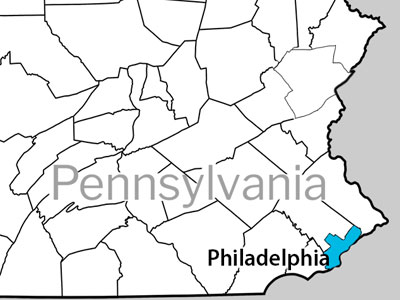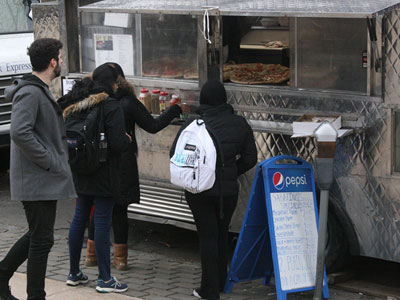In the county, municipalities control the land use aspects of food trucks while the Chester County Health Department addresses health related regulations.
How it Works
Food trucks can be frequently moved to different locations such as on-street parking spaces, parking lots, or event locations, they sometimes remain in a set location where permitted by a municipality or negotiated with a property owner.
Some food trucks sell reheated or pre-packaged food while others have on-board kitchens. Breakfast foods, sandwiches, hamburgers, and fried foods are common, but many food trucks serve regional or ethnic foods while others offer gourmet fare. Some food trucks are even Zagat-rated. Food trucks are now a multi-billion dollar business, and they continue to increase in popularity since they gained traction in the mid-2000s.
Municipalities should consider regulating food trucks to maintain public health, manage on-street parking spaces and congestion, reduce the potential for crowded sidewalks, establish rules for utility connections such as electricity or the use of generators, mitigate potential conflicts with established "brick-and-mortar" restaurants, and reduce confusion regarding applicable health and land use regulations. In Chester County, municipalities control the land use aspects of food trucks while the Chester County Health Department addresses health related regulations.
Benefits
Public Safety
Food truck regulations can control crowding and increase the safety of pedestrians on sidewalks or within parking areas, provide safety and visibility for vehicles on the road, and minimize the potential for food-borne illnesses.
Equity
Friction between fixed-location restaurants and food trucks can sometimes occur. Clear requirements for food trucks can help reduce confusion and facilitate the appropriate land use, economic, and social benefits of food trucks.
Response to Market Forces
Food trucks are part of the "pop-up" economy because they can be started with substantially less investment than traditional restaurants, be responsive to market changes and supplement events such as street fairs or festivals. Appropriate regulations can reduce confusion and mitigate market dislocations and potential animosity within the traditional restaurant economy.
More Choices
Properly regulating food trucks can help increase opportunities for customers by broadening alternative food options and expanding the hours and locations when and where food is available. Municipal zoning and other land use regulations can encourage a productive business relationship with craft brewers or vineyard owners, whereby food trucks can provide food to complement the beverages. Food trucks can also locate within industrial or commercial areas where traditional restaurants are typically are not available.

Municipalities may regulate food trucks through their zoning ordinance, a stand-alone ordinance, or within their municipal code.
Get Started
Municipalities generally regulate food trucks through their zoning ordinances. Food trucks can be permitted in a zoning ordinance as a "by-right" with appropriate requirements. If a municipality is highly concerned with congestion, the usage of scarce parking areas, and similar land use issues, food trucks could be regulated through the special exception or conditional use process to better address site-specific issues. However, regulating food trucks at this level would in most instances be unnecessary and is likely to discourage many owners from pursuing a permit.
As an alternative, food trucks may also be regulated by stand-alone ordinances or within the municipal code. These two latter options have some advantages over zoning regulations; as a municipality adapts to its food trucks and as the food truck economy evolves, stand-alone ordinances may be more quickly and inexpensively modified compared to zoning ordinances. The regulations could be amended into the zoning ordinance at a later time if appropriate.
Considerations
Existing Conditions/Demand
The municipality should determine where food trucks should be permitted, such as within on-street parking spaces, within off-street parking lots, on private property, or at an event.
Safety
Food trucks should be located where pedestrian and vehicle safety is maintained. Municipalities should decide whether outdoor seating will be permitted, whether trash receptacles should be available, and how the trucks will be relocated during times of snow removal or emergencies.
Public Health
The handling and provision of food is regulated by the Pennsylvania Department of Agriculture or a local department of health and food trucks are required to display current registration and inspection certificates. Food trucks should have convenient access to adequate clean and hot water necessary to wash hands or clean foods, as well as rest rooms. The municipality's first responders should comment on proposed food truck applications.
Location
A municipality should identify locations where food trucks may be appropriate, such as on-street parking spaces or within parking lots that will not result in unnecessary congestion, and where there is demand. Some municipalities do not allow food trucks to be located near schools and limit potential congestion by regulating how close together food trucks may be located.
Competition
The municipality should be sensitive to the effects of food trucks on established businesses, many of which have made considerable financial investments in their physical locations. Some municipalities require minimum separation distances between food trucks and brick-and-mortar restaurants. The municipality should decide on the maximum density of food trucks in an area.
Effects on Neighbors
The municipality should control potential adverse issues such as noise, odors, litter, and vehicle and pedestrian congestion.
Hours of Operation
The municipality should consider whether food trucks should be permitted to operate continuously or have limited hours, and how long trucks may remain in the same location.

Examples
The City of Lancaster regulates mobile food trucks.

The City of Philadelphia offers a guide on securing a non-permanent food establishment license.



